Every time a conservative attacks a political opponent, you know you've got the right person for the job.
When they call him or her "negative" or "unhelpful" you know they fear that person.
It's true in Canada.
It's true in the United States.
-srbp-
The real political division in society is between authoritarians and libertarians.
Every time a conservative attacks a political opponent, you know you've got the right person for the job.
When they call him or her "negative" or "unhelpful" you know they fear that person.
It's true in Canada.
It's true in the United States.
-srbp-
But no matter how you answer it, the Icelandic crisis is producing some interesting results: Sterling Airlines is filing for bankruptcy. It's part of of Northern Travel Group which also includes Astraeus Airlines.
Astraeus, the company that became embroiled in the St.John's-Gatwick fiasco a couple of years ago, is now out of the charter flight service and instead leases its aircraft to other companies.
-srbp-
The Obama campaign has transformed American politics already and there's still almost a week to go until it's over.
One of the many changes has been in campaign advertising.
Take this spot, for example, just one of almost 1800 professional videos on the official Obama campaign youtube space.
Then compare it to anything produced locally or nationally during the recent federal election campaign. You won't find many this simple or this effective.
Even at the local level high quality advertising is attainable. It requires only two things.
First, there has to be a willingness within the campaign to step away from the conventional.
These sorts of spots are not expensive to produce and air time can also be purchased strategically.
Second, there has to be a willingness to take professional advice.
In an upcoming post, we'll take a look at some of the best political advertising done locally. That's one you'll want to check out.
-srbp-
| In all important aspects of national politics, guile, compromise and a subtle kind of blackmail decided their course and determined their alliances. They appeared to discount all political or social ideologies, save nationalism. For the mass of the people the words Tory and Grit, Conservative and Liberal, referred neither to political ideologies nor to administrative techniques. They were regarded only as meaningless labels, affixed to alternatives which permitted the auctioneering of one's support; they had no more meaning than bleu or rouge, which eventually replaced them in popular speech. [They] on the whole never voted for political or economic ideologies, but only for the man or group which stood for their ethnic rights... In such a mental climate, sound democratic politics could hardly be expected to prevail, even in strictly provincial or local affairs where racial issues were not involved.... |
Premier Danny Williams apologized Tuesday for any grief and anguish that Newfoundland and Labrador breast cancer patients have suffered because of flawed laboratory tests.
"We take this personally," Williams told the Cameron inquiry Tuesday. "We certainly take responsibility, full responsibility, for any actions ... that might have contributed to this problem."Voice of the Cabinet Minister:
The Executive Director of the Canadian Cancer Society says he believes most people will accept Premier Danny Williams' apology, made at the Cameron Inquiry yesterday. Williams apologized on behalf of government to all who were impacted by the faulty breast cancer hormone receptor testing results. The Cancer Society's Peter Dawe says the words of remorse from the Premier seemed sincere.The Telegram:
“ I think it’s right I do so,” began Williams, launching into a seven-minute statement.A little distance from the subject matter - however - gives an entirely different perspective, one that is sure to cause some controversy.
“I want to apologize to the patients and to their loved ones and their families for what has happened here. I apologize as the current premier and I apologize on behalf of previous governments and premiers … that if we’ve hurt these people, in some way they’ve suffered, that I can certainly assure them it was not deliberate.”
Williams said there was no intention to harm anybody “under any circumstances.”
For some, Iceland remains a model to emulate.
For others, not so much.
18% interest rates are a thing of the past for the rest of us.
-srbp-
Dominion Bond Rating Service released its detailed report on Tuesday to back the changed rating for the Government of Newfoundland and Labrador.
On October 22, DBRS upgraded the province's long-term debt rating to "A from A(low)" but adjusted the trending assessment from "Positive" to "Stable". The short-term debt rating remained at "R-1(low)" with "Stable" trending.
The detailed report cites strengths, such as the reduced debt burden, growth of the offshore and a competitive tax position.
At the same time, DBRS cites several challenges.
Consistent with comments by the province's auditor general, DBRS notes the heavy reliance of the provincial budget on oil revenues which, DBRS says "introduces volatility to the fiscal results".
DBRS also noted unfunded pension liabilities and potential dependence on federal government transfers as issues of concern:
(3) Unfunded pension liabilities remain sizeable, projected at just over $2 billion in 2007-08. The Province has made considerable efforts to reduce these liabilities, largely as a result of the 2005 Atlantic Accord and other special contributions to help improve the funding position of both the teachers’ and public servants’ pension plans. However, declining interest rates and the recent deterioration in equity markets are likely to further add to unfunded liabilities.
(4) Through growing resource revenues, the Province has seen its reliance on federal transfers fall from greater than 40% in the 1990s to roughly 23% in 2007-08 but is nonetheless susceptible to significant changes in federal transfer programs. Any drop in resource revenues could result in a reversal of this trend and return to greater dependence on federal wealth redistribution programs.
DRBS is forecasting small surpluses through to 2010-2011 when it anticipates expenditures will outpace revenue growth. The surplus for 2008, given in the earlier release as $291 million, is actually exactly the surplus forecast by the finance minister. DBRS appears to have included an anticipated under-expenditure on capital account which makes up the difference.
However, it is important to note the difference in the accounting method used for the DBRS report and the finance minister's statement about a surplus compared to the figures presented in The Estimates. The premier alluded to this in an interview last week but didn't explain it.
DBRS' revenue projections report money in the year in which it was earned. Hence, it includes revenue from the 2005 offshore deal. However, that money was already received in 2005 and has been spent. It can't be received and spent twice.
The provincial budget documents (particularly The Estimates) account for this by deducting that amount in its calculation of borrowing requirements. The unaudited report on the Consolidated Revenue Fund (issued in August for Fiscal Year 2007) makes a similar adjustment as it reconciles a simple statement of revenues and expenditures with the actual cash flows. Thus, an apparent increase in revenues of $1.4 billion becomes a borrowing requirement of $110 million once all the financial transactions have been accounted for.
-srbp-
Front month light, sweet crude (WTI) settled at US$63.22 on the New York Mercantile Exchange Monday, down $1.45 from Friday's close.
Brent light sweet settled at US$60.30 a barrel down almost $27 from the provincial budget's assumed average price. Oil companies operating offshore Newfoundland and Labrador use Brent as the reference price for crude from the Hibernia, Terra Nova and White Rose fields offshore Newfoundland and Labrador.
While there is some uncertainty as to what effect falling crude prices will have on the current budget, a general recession in major markets and a lower price of oil could serious reduce provincial government revenues in 2009.
At an average price of US$60 a barrel, annual production of 120 million barrels and a dollar premium of 30%, the province's oil royalties would be something on the order of $1.5 billion. At 100 million barrels - slightly below the current year forecast of 111 million - the royalty take would be slightly more than $1.3 billion.
That is between $200 million and $400 million below the current year royalty projections in the budget.
To put that in perspective, bear in mind that if all the budget projections came true for the current fiscal year, the provincial government would be short $414 million on current and capital account and $794 million short overall.
Given the high oil prices at the front end of the fiscal year and the healthy consumer spending, the budget may come up balanced at the end of the year. It almost certainly won't be in a surplus as it hasn't been in surplus for the past two fiscal years by any measure most people would understand. If you have to borrow $110 million at the end of the year to pay off the bills and settle up accounts, then there was never really a surplus of $1.0 billion of $1.3 billion as claimed. It may have existed in some form of accounting but at the end, the budget came up cash short.
As an aside, the Premier tossed aside an opposition claim that there was confusion coming from provincial government statements on the economic crunch. He said something to the effect that the opposition spokesman didn't know the difference between cash and accrual accounting.
That's really neither here nor there. In his news release last week, Kelvin Parsons noted that Dominion Bond Rating Service had projected a surplus of $291 million while the provincial finance minister had forecast $544 million when he brought down the budget last year. Both those numbers are expressed on the same basis, as is plain from the context in the DBRS news release.
In other words, DBRS is projecting a smaller surplus than the one the government had projected. That much is absolutely correct: $544 million versus $291 million
By the same token, the comparisons at Bond Papers - which some may be finding a bit tedious at this point - have been done on a comparison of apples with apples.
No matter how one looks at it, the odds are high that the provincial budget for Fiscal Year 2009 (starting 01 April 2009), will have to either reduce public spending or undertake some borrowing. If the current budget were repeated exactly as is - exactly the same spending levels - and allowing only for the reduced oil revenues, the provincial government would have to borrow almost as much money as it would take in in oil revenues in order to balance the books.
Think about that for a second.
For the past two years, the provincial government has been able to underestimate oil revenues knowing that - in all likelihood - actual revenues would greatly exceed what they forecast. At the end of the year, they have claimed huge surpluses. In fact, the spending projections took into account the anticipated real price for oil, as opposed to the conveniently low-balled assumption. The auditor general made reference in his report earlier this year to the tendency in recent years to inflate spending based on highly volatile oil prices.
Starting this year, however, that pattern of low-balling revenues has essentially failed. The global downturn, now estimated to last into 2010, means that for at least one and possibly the next two fiscal years after this current one, the provincial government will be dealing with dramatically reduced revenues. At the very least, they can't count on the conjuring trick of windfalls to get them out of the heavy level of planned spending without resorting to borrowing.
And if you consider it, borrowing even a half a billion dollars a year is not a huge amount on a budget of $6.0 billion or more.
It is a huge amount if one considers doing that for a couple of years will add a billion dollars or so to the provincial direct debt.
It is a huge amount when one considers that at the same time, the provincial government is considering launching a development project on the Lower Churchill that could add as much as $6.0 to $9.0 billion on a public debt (accumulated borrowing) which is already hovering at about $8.5 billion.
Discussing the state of the current provincial budget balance may not be as useful and exercise as forecasting for 2009. The current administration may have to actually make difficult choices, for the first time in a very long time.
-srbp-
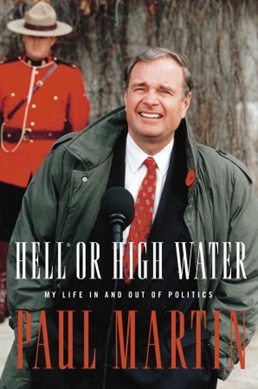 Not every prime minister writes a book worth reading.
Not every prime minister writes a book worth reading.
Pierre Trudeau's memoir was nothing if not dull as dishwater.
Not even every politician's memoirs are worth the cost of first printing.
Who was smart and waited to get Tobin's thingy in the remainder bin?
From the reviews, Paul Martin's book won't fall into the dull category.
The blurb:
Paul Martin was the Prime Minister we never really knew — in this memoir he emerges as a fascinating flesh and blood man, still working hard to make a better world.
“The next thing you know, I was in a jail cell.” (Chapter 2)
“From the moment I flipped his truck on the road home to Morinville. . .” (Chapter 3)
“When I came back into Aquin’s headquarters I had a broken nose.” (Chapter 4)
These are not lines that you expect in a prime ministerial memoir. But Paul Martin — who led the country from 2003 to 2006 — is full of surprises, and his book will reveal a very different man from the prime minister who had such a rough ride in the wake of the sponsorship scandal.
Although he grew up in Windsor and Ottawa as the son of the legendary Cabinet Minister Paul Martin, politics was not in his blood. As a kid he loved sports, and had summer jobs as a deckhand or a roustabout. As a young man he plunged into family life, and into the business world. After his years as a “corporate firefighter” for Power Corporation came the excitement of acquiring Canada Steamship Lines in Canada’s largest ever leveraged buy-out, “the most audacious gamble of my life.”
In 1988, however, he became a Liberal M.P., ran for the leadership in 1990 and in 1993 became Jean Chrétien’s minister of finance, with the country in a deep hole. The story of his years as perhaps our best finance minister ever leads to his account of the revolt against Chrétien, and his time in office.
Great events and world figures stud this book, which is firm but polite as it sets the record straight, and is full of wry humour and self-deprecating stories. Far from ending with his defeat in 2006, the book deals with his continuing passions, such as Canada’s aboriginals and the problems of Africa.
This is an idealistic, interesting book that reveals the Paul Martin we never knew. It’s a pleasure to meet him.
-srbp-
the Republican presidential and vice-presidential candidates are taking potshots at each other, even if it is through their staffs.
-srbp-
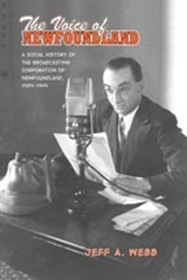 Jeff Webb's The Voice of Newfoundland: A Social History of the Broadcasting Corporation of Newfoundland, 1939–1949 is in bookstores now.
Jeff Webb's The Voice of Newfoundland: A Social History of the Broadcasting Corporation of Newfoundland, 1939–1949 is in bookstores now.
The blurb:
Similar to the CBC and BBC, the Broadcasting Corporation of Newfoundland was a public broadcaster that was at the centre of a cultural and political change from 1939 to 1949, during which Newfoundland faced wartime challenges and engaged in a constitutional debate about whether to become integrated into Canada. The Voice of Newfoundland studies these changes by taking a close look at the Broadcasting Corporation of Newfoundland’s radio programming and the responses of their listeners.
Making excellent use of program recordings, scripts, and letters from listeners, as well as government and corporate archives, Jeff A. Webb examines several innovative programs that responded to the challenges of the Great Depression and Second World War. Webb explores the roles that radio played in society and culture during a vibrant and pivotal time in Newfoundland's history, and demonstrates how the broadcaster’s decision to air political debates was pivotal in Newfoundlanders’s decision to join Canada and to become part of North American consumer society.
An engaging study rich in details of some of twentieth-century Newfoundland’s most fascinating figures, The Voice of Newfoundland is a remarkable history of its politics and culture and an important analysis of the influence of the media and the participation of listeners.
Put it on the Christmas gift list of someone you know who wants an insightful look at an aspect of broadcasting in pre-Confederation Newfoundland and Labrador.
Don't mind the University of Toronto Press website that says the book is not yet published or the price, listed at $65.00 cloth.
You can find it in local bookstores now, in paperback for under $30.
-srbp-
Sometimes newspaper stories on political polls are amusing if only because they go to great lengths to explore a relatively simple thing.
Like say, a story in the Globe and Mail that makes it sound like there is some confusion in polling results such that no one knows whether Barack Obama is leading John McCain or vice versa.
The Associated press poll this past week showing Obama and McCain ina dead heat is an outlier. It's wrong. It's Dewey beats Truman all over again.
Pretty well every other national poll in the United States has Obama significantly ahead of McCain.
And if you want a look at all the polls - national and local - trending over time, try the really neat interactive display the New York Times posted online.
-srbp-
One the one hand, Premier Danny Williams believes the provincial government will be able to avoid slipping into deficit in this fiscal year:
"I'm confident we will be OK. Now look, if oil drops to $10 a barrel, that is a whole different situation, but we certainly don't see that happening," he said.
In the same interview with CBC's David Cochrane, he said this:
"So if we're [$]120 on the front end and we're [$]60 on the back end, we end up exactly where we budgeted," he said.
"Exactly where we budgeted" is a $414 million deficit on the combined current and capital account and a further $380 million in borrowing to cover other financial transactions for a grand total of $794 million in new debt.
That's not the $544 million surplus the finance minister mentioned in his budget speech.
It isn't the $291 million surplus Dominion Bond Rating Service projected just this week.
And it sure as heck isn't anything close to meeting or exceeding the surplus projections. In early October, Memorial University economist Wade Locke predicted that the provincial government "should have a budget surplus even bigger than they what they had forecast." That wasn't even likely when he made the prediction.
Oh, by the way, the shortfall last year - covered by new borrowing - amounted to $110 million, not the $88 million reported in the spring budget. You'll find the revised figure in a report on the government spending for Fiscal Year 2007 published quietly - without a news release or a mention in public - last August.
The confused picture of the provincial government's financial state won't be made any clearer until late November - or maybe early December - when the finance minister issues a "mid-year" financial update.
The middle of the fiscal year is October.
-srbp-
While the news contains more details of the global financial crisis, let's just enjoy some accounting levity from an earlier time.
The Crimson Permanent Assurance, in two parts.
Dominion Bond Rating Service said on Wednesday that Newfoundland and Labrador is expected to post a current and capital account of surplus of $291 million.
DBRS did not point out in its news release that even with that current and capital account surplus, the provincial government would need to borrow about $90 million to meet all its budgeted financial obligations.
That means that for the third year running, the provincial government is on track to post a deficit at the end of the fiscal year.
The bond rating agency also did not say that the $291 million figure is well below the $544 million surplus originally included in the budget speech. DBRS did note that:
while the recent sharp downturn in oil prices introduces uncertainty in the fiscal outlook, the Province’s conservative oil price assumption (US$87 per barrel), the recent depreciation of the Canadian dollar and the fact that oil prices were well above budget throughout the first six months of the fiscal year should help ensure that fiscal targets can still be achieved.
Of course, the DBRS version of the surplus (restricted to capital and current account, not all financial transactions), is closer to the Bond Papers version than it would be to the opinion offered recently by Memorial University economist Wade Locke.
You may recall he predicted that the province was poised to produce a surplus "even bigger than what they had forecast."
The most curious part of the DBRS assessment is this:
Despite near-term challenges, DBRS notes that the Province has accumulated a reasonable cushion to sustain a slowdown in resource activity, including another sizeable surplus foreseen next year. Nevertheless, further improvement in Newfoundland’s ratings will likely depend on the Province’s ability to turn its newly developed resource wealth into sustainable economic growth and maintain fiscal discipline.
Accumulated a reasonable cushion?
That's a bit hard to do if every nickel has been spent over the past few years.
It's also interesting - if that's even an adequate word - to see a forecast surplus for next year, let alone one that is "sizeable".
See if you can find any public statements by the provincial government that they will experience a surplus next year.
You might also scratch your head at the portion of the release that indicates:
A moderate rebound [ in gross domestic product growth] is expected for 2009, driven by additional oil production and further progress being made on large capital developments, although the rapid deterioration in global economic conditions maintains uncertainty in the outlook.
Large capital developments like the second refinery at Come By Chance? Or Hebron, which is not yet sanctioned? This sounds a bit like the TD Economics forecast that had Hebron pumping oil in 2014, a physical impossibility if ever there was one.
Something suggests this decision by DBRS will be revisited in the next quarter, as the global economic situation shifts.
-srbp-
TD Economics latest forecast for provincial economies has the Newfoundland and Labrador economy growing at less than one half of one percent in fiscal 2008, the lowest growth rate of any province in the country.
The quarterly forecast, issued October 16, puts real growth in gross domestic product only slightly behind that of Ontario and projects 2009 growth as being about 1.3%.
However, if the oil comments in the forecast are anything to go by, there is reason to doubt the validity of the TD Economics forecast:
After super-sized growth of 9.3% last year led by offshore oil output and exports, the Newfoundland & Labrador economy will struggle to expand, on an annual basis, in 2008. While high oil prices have helped to boost incomes (wage growth is running at 8.7% year-to-date), oil extraction is depressed due [to] the maturation of the oil fields. This will continue into 2009 and 2010. Expansions at the Hibernia and White Rose fields could help level off output, but a sustained rebound in oil production is not in the cards before 2014, which is when the Hebron project could come online.
Hebron won't start construction until about 2013/2014 - according to the project partners - and that assumes the project is sanctioned within the next 12 months.
First oil is not currently expected before 2018, assuming a very short construction.
Even at that point, Hebron will will merely replace production from some existing fields which at that point will likely have been all but exhausted.
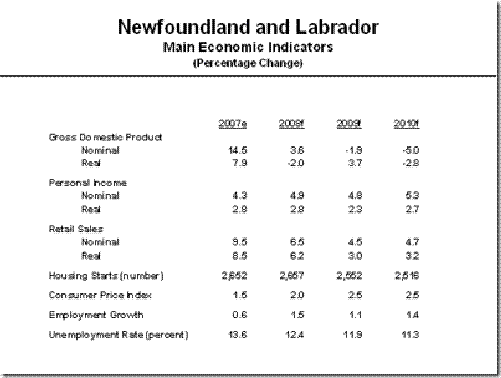 TD Economics' forecast for Newfoundland and Labrador matches almost exactly the projections by RBC Economics. Scotiabank's 2008 forecast is higher, at 1%, while its projection for 2009 matches the TD and RBC projection exactly.
TD Economics' forecast for Newfoundland and Labrador matches almost exactly the projections by RBC Economics. Scotiabank's 2008 forecast is higher, at 1%, while its projection for 2009 matches the TD and RBC projection exactly.
The provincial government's budget forecast [left, Budget Speech]including a 2% shrinkage in real GDP in 2008, growth in 2009 now three times higher than that of private sector forecasters, followed by -2.8% in 2010. The provincial government forecasts nominal GDP growth at -1.9% in 2009 and -5.0% in 2010.
The province's finance minister hasn't indicated when he will issue a mid-year economic update. He has been portraying the gloomy private sector forecasts as an improvement on the provincial government's own budget estimates. At the same time, he hasn't reconciled his glowing revenue forecasts with the budget numbers. The contradictions remain unexplained.
While both the Premier and Memorial University economist Wade Locke have given rosy projections for the province's ability to avoid any dramatic consequences from the global crisis, it seems unlikely the Newfoundland and Labrador economy will be able to sustain Locke's pollyannaish claim that government's projections of a half billion dollar surplus will be met or exceeded.
On Wednesday, the Ontario government revised its budget estimates and is now projecting a half billion dollar shortfall for fiscal 2008.
-srbp-
Front-month crude oil settled at US$66.73 a barrel in trading Wednesday. The rate for the benchmark West Texas Intermediate fell more than five dollars over the day.
Brent, the benchmark for light, sweet crude offshore Newfoundland and Labrador, finished trading at US$64.52 per barrel on the New York Mercantile Exchange. Reduced demand is the key factor in the lowered prices.
Some analysts are speculating that major international projects such as oil sands and deep water offshore major be jeopardized by the falling oil prices. However, Husky Energy's John Lau is quoted by the Globe and Mail's Report on Business:
"I'm quite sure major developers with deep pockets will continue to focus on oilsands development," Mr. Lau said. "Oil sands developments are very special projects. [But] in view of the high costs and also labour shortage, most of the of the small projects are facing a lot of challenges."
-srbp-
At the Cameron Inquiry, that is.
Not much work will be done across Newfoundland and Labrador that day as eyes will be tuned to televisions and to the live stream on the Internet.
Mark the date: October 28.
There's a bit of history to this, with Williams lashing commission counsel and the commissioner herself after members of Williams' staff gave testimony earlier this year.
-srbp-
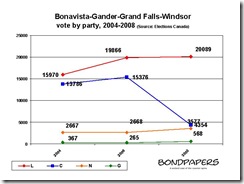 Danny Williams told Provincial Conservatives on the weekend something to the effect that the federal Liberals in the province were bouyed up by Provincial Conservatives.
Danny Williams told Provincial Conservatives on the weekend something to the effect that the federal Liberals in the province were bouyed up by Provincial Conservatives.
He said something about Liberal's claiming there was a Red Tide - which no one has been talking about - being the result of some Blue bubble or other.
Nothing could be further from the truth, as he likes to say.
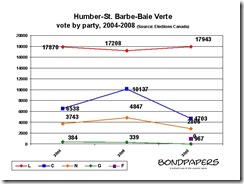 For your edification, amusement and general annoyance, here are the vote results for the ridings held before this last election by the same Liberals who won them again.
For your edification, amusement and general annoyance, here are the vote results for the ridings held before this last election by the same Liberals who won them again.
Note that the only significant variation - almost the only variation at all, in fact - was in the near complete collapse of the Conservative vote.
And that's all thanks to the Family Feud.
 Bonavista-Gander-Grand Falls-Windsor? Scott Simms increased his vote share as he has done in each election since 2004, but the Blue guys sank.
Bonavista-Gander-Grand Falls-Windsor? Scott Simms increased his vote share as he has done in each election since 2004, but the Blue guys sank.
Ditto Humber-St. Barbe-Baie Verte where the family Feud just killed off Connies. It didn't migrate appreciably to anyone else.
And then there's Labrador. You needn't worry about the smaller parties.
Just look at the Blue Line.
Almost too small to even notice.
In many parts of the province, the only noise in the election was a big sucking sound for the Blue team.
According to the provincial premiers, "Canada's economic fundamentals are sound".
Like we haven't heard that one before, and not from Dubya and Steve, either.
There's nothing like an international economic crisis to end the go-it-alone talk, either.
"We're here to indicate to Canadians that we're prepared to act as a united front. We're in good shape, which is not to say there aren't problems, but we're in the best situation in the world."
The premiers apparently agreed to drop inter-provincial trade barriers as one sign of viewing the country as a whole.
People in Newfoundland and Labrador are all too familiar with the go-it-alone stuff, but they've grown so used to the contradictions between the words and the actions, they'll likely wonder how come the two have suddenly matched up on the "we are all Canadians" side.
It's like telling a crowd of Provincial Conservatives in Corner Brook that "[t]his great provincial party has taken our province in a whole new direction towards 'have' status and self-reliance. No more give aways, no more begging from others.…" right after sending the latest round of begging letters to Ottawa.
Jack Harris coined a phrase that will go down in local political history.
-srbp-